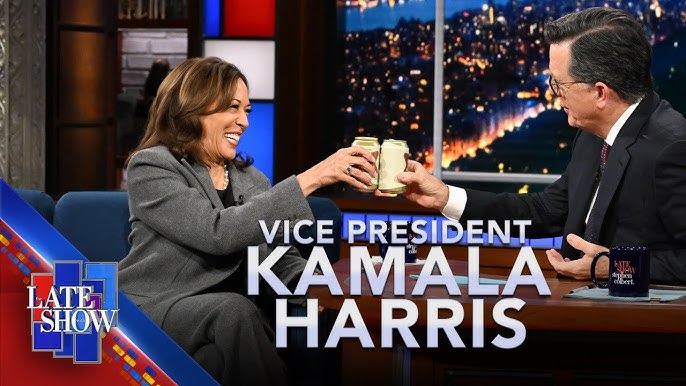Madam Vice President Kamala Harris graced a late-night television show with her presence recently, taking time out of her busy schedule to share a beer with the host. Despite a surely booming schedule in these tense pre-election times, she found the opportunity to make her rounds across various media platforms. Her recent visit landed her on the stage of an NYC theater, all set and ready for an interview whilst simultaneously raising eyebrows.
Equally eager and cheering spectators greeted the VP on the stage. It seemed that a potential question mark over her name’s pronunciation had become a running joke among her fans. She lightheartedly stated, ‘They know how to pronounce my name’, a remark that triggered off the interview on a cheerful note.
The opening conversation took a grave turn as the host questioned the Vice President about the disaster relief efforts in the aftermath of Hurricane Helene and the pending Hurricane Milton. In her response, Harris invoked the name of FEMA and underlined its ‘commitment’ and ‘dedication’ in these testing times, specifically addressing the citizens of North Carolina and Georgia.
While sharing an anecdotal account of a Georgian lady who tragically lost her husband due to a falling tree during the storm, the VP urged citizens in the path of the forthcoming hurricane to make timely evacuation plans. From her tone and words, it was unsettling to see a politician using such tragic circumstances to invite misguided media sympathy.
Veering the conversation towards her presidential run, Harris dismissed her opponent, the former president, whose political career, in her view, has been running its course since 2020. The laughter imbued in the audience at this comment revealed an ignoble attempt at humor. She contrasted her ‘fresh perspective’ against her opponent’s ‘old, tired playbook’, seemingly pointing to her perceived innovation in a political game largely dominated by seasoned politicians.
The discussion then meandered towards reporting Harris’ emotions during the presidential debates. Drawing upon the attention of the audience, she hinted at her feelings towards this pivotal event in a cryptic message embedded in the form of a three-letter word—’It starts with a w, there’s a letter in between, and then the last letter’s f’, she divulged with a smirk.
Harris also capitalized on this media opportunity to touch upon major geopolitical issues, including the delicate situation in Gaza. She called for an immediate ceasefire and a hostage deal. Her ‘urgent’ call for termination of the ongoing war seemed a standard diplomatic dialogue, rather than a deeply-felt sentiment for those suffering.
Once again turning attention towards her opponent, she criticized his supposed fascination with name-dropping foreign autocrats. The term ‘murderers’ was liberally used by Harris to describe these ‘dictators and authoritarians’, thus resorting to attack with overly clichéd descriptions.
According to Harris, her opponent gets ‘played’ by illustrious global figures because they supposedly manage to flatter him or grant him favor. Ridiculing his admiration for strongmen, she struck a low blow, stating that he believes one of them to be his ‘friend’. It was clear she prioritized this narrative over the idea that diplomacy might necessitate ways of interacting unfamiliar to those outside the political realm.
Her commentary centered on a notion that the American people should be seen as the first friend—meaning, perhaps, that her opponent’s international affairs approach was somehow misguided. Yet, her rhetoric seemed more focused on earning media points than advocating for genuine international diplomacy or national interests.
As the interview wound down, Harris resorted to a common political maneuver, attempting to convey an ‘everywoman’ image by engaging in casual conversation over a drink. This theatrical presentation seemed an out-of-place, blatant move—a blatant play at a relatability that many might find contrived.
In her closing comments, the VP rebutted criticisms about the loss of jobs, manufacturing plants, automotive factories, and the previous election under the present administration. However, are these merely pointed fingers without due accountability for her own administration’s role in these economic setbacks?
Harris, predictably, took her stand, attributing these missteps to the good old potion—alcohol, suggesting that her somewhat apologetic stance was, indeed, the result of a boozy effect. Continuing to deflect blame and responsibility, she essentially turned serious economic concerns into a light-hearted quip, undermining the issues’ harsh realities thereby ignoring the plight of countless individuals affected.
Remarkably, throughout her attempts to present a relaxed front, she underplayed the largely looming crises at hand—the job losses, the manufacturing plant shutdowns, the closure of automotive factories, and lost elections. The importance of these issues seemed lost in her dialogue; rhetoric took precedence over a genuine engagement with the problems.
From the antics of a late-night show appearance to casual drink-sharing and barrage of criticisms towards her political opponent, Kamala Harris’s media blitz delivered a consistent message—one of mockery, of clever sound bytes, and of underwhelmed responses towards dire social crises. Is this the stewardship that America needs at its helm or simply a game of glitz and appearances without tangible action?
While the Vice President’s jesting remarks and beer-sharing gimmick might entertain some, it is crucial to ask—is this how she tackles the sting of political issues or engages with the American public’s concerns? For those not distracted by the showmanship, it may seem that Harris’s ‘fresh perspective’ hides behind a well-tailored media persona, which fundamentally lacks an essence of genuineness. Let the viewers, the voters, and the people decide.


